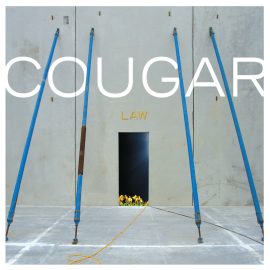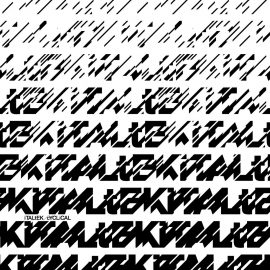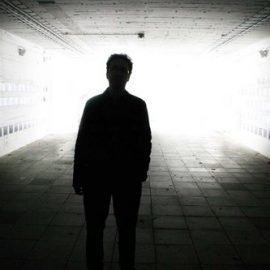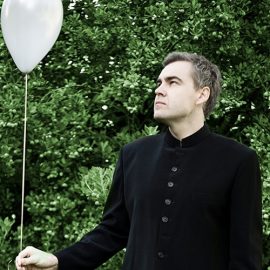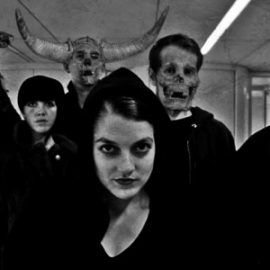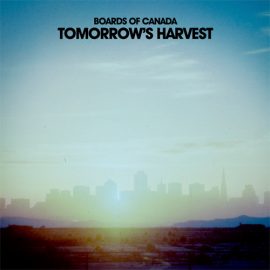
Hey Dennis, what have you been up to this past weekend?
Mostly a stress-free weekend actually, mainly managing a few boring post-release jobs that needed to be done after my new album was released earlier in the week, as well as enjoying having my feet up, with a giant air-fan blowing a cool breeze onto my toes! It’s really warm here in England at the moment, so I’m trying to relax and take things easy before I melt away. After working on the album for the last year, I think I deserve a little break! It’s hard to overstate just how tiring and demanding releasing a new record is. In fact, it’s often far more tiring than making the music itself, especially when it’s my own label and I’m the main distributor to all the lovely people around the world who buy my music. I can’t complain though and life is good!
I wanted to start at the beginning and ask how you got involved with music production.
I’m not from a musical family in the traditional sense, but everyone in our house enjoyed music in their own way. Like most kids, if you’re surrounded by something you love as you’re growing up, then chances are it is going to influence you and become an important part of your life when you’re older. I’m from the UK, which has this really important legacy in electronic music. Almost all of my favourite artists were born here. We’re a tiny island, with a huge voice. It’s weird growing up here and being involved in music, because the shadow of a thousand ghosts is always behind you and you’re constantly aware of the groundwork these artists made as you pave you own path and discover your sound. It’s great though, because it encourages you to try harder and push yourself further.
I started making music in 2004, initially messing around with basic gear/software and not really having a clue what I was doing. I learnt production completely independently, never playing any instruments, never really understanding the theory side of things, and without reading any tutorials or have someone guide me what to do etc… just me, having the knowledge of what sounded right in my head thanks to 20 years of listening to music, trying my hardest to translate my ideas from my brain onto the computer. It’s not exactly the best way to learn, but I didn’t care really. I just wanted to see if I could do it. I made a lot of pretty naive, rubbish-sounding tunes, which at the time I thought were amazing, but in retrospect were quite awful, but every track I made was a step further and a part of the learning experience. I made loads of tracks from more genres than I could count, but it was always something I did to satisfy my own creative urges and I never initially had any intention to release anything in any official capacity.
Around 2006, on a whim, I decided to start a vinyl label with some mates, which was kind of our tribute to the 92 oldskool hardcore/breaks sound we all loved when growing up. Mostly sample-based, heavy bass/percussive music that was kinda tongue-in-cheek but made with genuine passion nonetheless. We did it as a laugh really, but it kinda took off unexpectedly and we ended up being invited to play on Eddy Temple-Morris’ XFM show in London, as he was apparently a big fan of ours and wanted to help us out. He played our stuff to hundreds of thousands of people on both the radio and in places like Ibiza, which just blew our minds really. Here we were, making these cutup-style rave tunes from old samples and it was being played to everyone, from kids wasted on ketamine, to middle-aged truck drivers, listening to the radio through the night! This was before the hardcore/rave revival thing came into effect by artists like Zomby etc, so it was almost unheard of to have such weird music played to the masses, outside the Peel show. I received so many emails from people who were around the first time in 92, telling me they were almost in tears because our music brought back memories of their halcyon youth. It was such a great feeling to know we had made an emotional impact on people, however small, even though we were just this bunch of guys, working from our bedrooms, making tunes on our laptops. I loved it. The funny thing is, we also managed to snag some pretty massive artists to make a few tunes anonymously for our label, thanks to one of our guys being very close friends to them. People still don’t know who they are, but I guarantee if they did, our old 12″ vinyl releases would be hitting ebay for hundreds of quid right about now!
Anyway, this all came to an end around late 2007. I had just finished university at the time and started working in a graphic design studio in Leeds. I had zero time for music any more, as I was working 9 hour shifts, with a daily 3 hour commute from my house to the studio. I was absolutely broken by the time I got home, both physically and creatively. I love graphic design, but this isn’t a career for lazy people. I spent time at a few studios in London and they actually have beds/showers on site, so that the staff can effectively live there, constantly working. Fuck that. People need a break from their work, if only to recharge. Eventually, I realised that this wasn’t for me and after saving up for a few months, I left my job around Christmas 2008, with the aim to work freelance from home, whilst spending the downtime I had working on music.
I had already made a few early ambient tunes called “Inside” and “2249” a few years back, which I felt had the potential to translate into a full-length album, so I spent around 12 months working on music aimed for the head/heart rather than the feet. I can’t say I ever had any real plans to make an explicit “ambient” album, but I always loved the genre and it just felt right at this moment. Slowly, it came together and my debut album Hypersona was completed in November 2008. I’ve been making music under the alias 36 ever since.
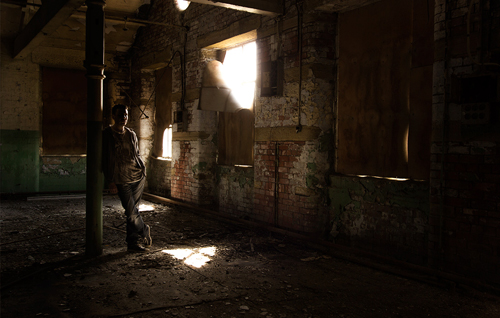
So tell us about the name that you chose, 36 – where does that come from, if it’s not a secret? Is it a coincidence that the sum of 1 to 36 is 666?
There are few coincidences, especially with numbers! It’s weird though, the number 36 has been with me all my life. I don’t even know how it started actually, but once it embedded itself in my head, I saw the number everywhere. It’s a bit like that Junji Ito comic “Uzumaki” where people see spirals everywhere they go. I just couldn’t get away from it. It was all I thought about. For instance, I remember being at this Victorian-themed school trip when I was about 8 years old and the teacher/actor was asking everyone these really difficult multiplication math questions (well, difficult for my age!). Everyone who got the answer wrong was shouted at and a few were made to wear dunces caps and sit in the corner of the room! As a kid, this is pretty much the worst thing that can happen to you haha. Anyway, the time came for my question, and the teacher asked “Dennis, what is 6 multiplied by 6?”. I thought I was dreaming. Of all the possible combinations of numbers they could have asked, this was the one they chose. Obviously I knew pretty much everything about the number 36, especially its divisors and instantly answered it. I probably had a really smug look on my face. No dunces cap for me! It’s silly, but it’s stuck with me. I’ve got loads of stories like that.
I love everything about the number 36. The shape of the written number, the phonetic sound as you pronounce “three-six” and the association it has with various things. Take for instance the Hebrew concept of Tzadikim Nistarim. They believe that at any one time, there are 36 special individuals on earth and that if just one of them were to suddenly disappear, the world would come to an end. They don’t know each other, and they have no realisation of how important they are, but they are utterly crucial for all life to exist. It could be you. It’s a brilliant concept. I’m not religious at all, but I love a lot of the stories and ideas found in the various texts. Like you say, the sum of the integers from 1 to 36 is 666, which is a very different religious concept entirely! It’s fun learning about it, but don’t start wars or kill people over it please!
And what about the samples on “Perfect Numbers”. Reminds me a bit of Boards of Canada sound with Numbers Station samples. Where did you get those and is there a special meaning behind them?
As the title suggests, the woman is actually reciting an even “perfect number” specifically the 12th known sequence. It’s not actually sampled from a numbers station, but was something I made specifically for the track, using text-to-voice and then cutting it up to create a REX file I can trigger at will from my keyboard/sequencer. There’s this really wild arpeggio sequence in the background, which has this very unsettling, almost psychedelic response in my brain. It’s struggling to keep sync. It sounds like chaos, whereas the numbers are the antithesis; Order and perfection. It’s like this beautiful balance, striving for harmony in opposites. I’m actually rubbish at math, but I love numbers. I can see why people get lost in them.
You’ve continued to self-release music for all these years – any reason why you haven’t signed up on a label?
I think the simplified reason is that I feel I can do a perfectly good job of releasing my music myself. Talking more generally, the primary aim for most musicians who choose to publicly share their work is simply to get their music heard. Right now, thanks to the internet and sites like bandcamp, limited run, etc… this has never been easier. Labels once held everything behind lock and key, being the arbiters of what people should listen to, how an artist/band should sound, and the image they should project of themselves. This is fine and they’re perfectly within their right to curate the sound they’re trying to promote, but I personally don’t need a label to tell me how I should sound or what style of music I should make. I’m a grown man, and by now, I know myself and my music better than anyone else possibly could. I also make a lot more money selling direct, but that’s not the main reason I do it.
Labels have asked me to work with them in the past and sometimes I accept and sometimes I politely decline. For albums and other major works, I prefer to release them myself, simply because I have complete creative control and ownership of my material. I can decide where it is sold, the format it is pressed on, how many are made, and who can use it, which is a luxury many artists don’t have, much to their disdain. For compilations, remixes etc… then I actually prefer to release them on other peoples labels, mainly because they are often the brainchild of the label owner/original producer anyway and it’s more of a collaborative effort. Recently, I’ve been featured on Ultimae, A Strangely Isolated Place, and a few others I can’t discuss yet. They’re all great labels, who respect their artists and work with them so they feel at home. More importantly, they have total faith in their artists and don’t interfere in the creative process. Having the sense to leave the artist alone and let them do what they do best is what separates a good label from a bad one.
Maybe it’ll change in the future. Doing everything yourself is a lot of hard (but rewarding) work and as life circumstances inevitably shift, I may have little choice in the matter. For now though, I’m perfectly happy doing my own thing, in my own little world.

Dream Tempest is definitely a brighter and ‘more optimistic’ album, as you say yourself. Was there a particular event that prompted you to move in this direction?
No major life event, or anything as dramatic as that. My previous albums before this were Lithea, and Shadow Play. I think it’s fair to say that both of these were pretty intense, often flirting with the darker side of sound, especially from an emotional perspective. “Deluge” for example still almost brings me to tears. All my work has this inherent glowing melancholy, which is just a natural part of my sound, and one I’ll probably never shake-off. I do try to discover all aspects of the emotional spectrum during the course of my albums, sometimes with more success that others.
Dream Tempest is an album of two parts really. The first half is “brighter” because when we’re young, we look at the world with this blunt sense of awe and wonder. Everything seems like magic. I introduced this theme with the Sun Riders 7″ I released earlier this year (of which the 3 tracks are also featured on this album) which was quite a playful, child-like record, using a lot of toy-instruments, music boxes etc… Even the title track “Sun Riders” gave me a sense of wonderment and felt inspirational to me, though some people said it also made them quite sad. Maybe it’s that sense of longing for the unknown that we all sometimes feel. Something lost or just out of reach. Someone said it reminds them of Brian Eno’s “Ascent..” which is a wonderful compliment.
As the album progresses, there is a noticeable change and the tracks become more sombre, more intense, or maybe a little darker. I see it as analogy for growing up, and learning about the reality of life and responsibility. What once was seen as magic suddenly becomes explainable by science. I’m fascinated with the theory that our universe is ever-expanding, in a state of perpetual forever, eventually reaching total entropy / heat death. Everything that ever was, frozen forever, in a kind of time-lock. It’s depressing in many ways, but also quite beautiful in others. It’s quite a celestial album, but it’s roots are firmly planted on earth. Or something like that haha.
I’m sure others will see it very different to me and I love reading how people interpret my work. Nobody is wrong when it comes to music. Your feelings when listening are your own.
I love the sonic textures on the album. Can you share the hardware/software used in its production?
I intentionally used quite a lot of new instruments on this album, trying to make it sound different from my other work. I like to combine real recorded instruments (mainly from Kontakt libraries, which I blow most of my money on) with my synths, to create these hybrid sounds, which phase between synthetic and real. Even the music box in “Hyperbox” is actually a combination of many different sounds, harmonising into something quite unique. It’s mechanical without sounding soulless, at least to my ears.
I was lucky enough to work with some material Steven Wilson (founder of Porcupine Tree) sent me for the track “Redshift”. Outside of being this hugely respected prog rock superstar, he also makes ambient/experimental music as Bass Communion, of which I’m a massive fan. His drone works are often made using his guitar, but by the time they’re processed, they sound more synthetic, more otherworldly. In contrast, I mainly work with synths, so even though it might sound like I’m using a guitar, it’s actually a synth pad or bass/lead, distorted through guitar amps and doused in reverb/delay. It sounds like a guitar, but it’s not… you can sense there’s something off with it, something not quite right… and then I’ll mix that with an actual guitar and you’re left thinking “what the hell is this anyway?”
I just like to experiment and find the best instruments that realise the sounds I have in my head. I don’t care what it is. It can be a combination of 20 Kontakt patches, a real instrument, a field recording, a sample or even just a preset. By the time I’m done with it, it’ll sound like something else anyway.
I also did more live sessions on this album. The tracks “Tired” and “Entropy” for example were made in only one or two takes, with very little time spent afterwards on additional editing etc… Usually I’m very meticulous and program all notes quite obsessively, making them perfect, but sometimes it’s better just to let go, remove logic from the equation and let chance take over. Vibe the moment. Those two tracks would never work as well if they were quantised and slaved over for days on end. The soul would have been ripped out of them. I probably wouldn’t have been able to do this years ago, but I’m a little older now and know when to back off and leave things alone.
There is definitely a ton of music these days in the world, and I totally understand your desire to keep your music indispensable. What are your thoughts on the preservation of sound and what is it do you think that will keep a particular piece still fresh in a decade from now?
It’s not even about keeping music fresh really, as new genres come and go like the wind and if you’re constantly searching for only new, unheard styles of music, then chances are that you’re going to leave a lot of great music behind you. I hardly even hear much new music these days, as I’m still listening to tunes from 20 and 30 years ago, which still sound like the future to me. I mean just listen to “The Final Frontier”, “Entering Quandrant 5” or “The Illuminator” by Underground Resistance. These are masterpieces that still sound amazing today. Production wise, they give away their age a little, but emotionally they still take you to exactly the same places they did back then. It’s the same with that track “Release To The System” by Mark Franklin from the Artificial Intelligence II compilation on Warp. I still get goosebumps listening to it.
Maybe nostalgia plays a big part in it. You can listen to tunes which meant a lot to you from back in the day and they remind you of happy times in your life. Important memories you thought you forgot, that resurface by a melody or a sound. If a piece of music means that much to you that you’ll buy it, play it on repeat for days on end and still feel a connection to it every time you click play, then I feel that I’ve succeeded as an artist. I don’t think theres any one solution to achieving this, other than being honest with yourself and writing music which you really care about and put everything into. It can be for the dancefloor or your headphones. It doesn’t matter. All that matters is you wrote it with pure intentions and it reaches the right audience.
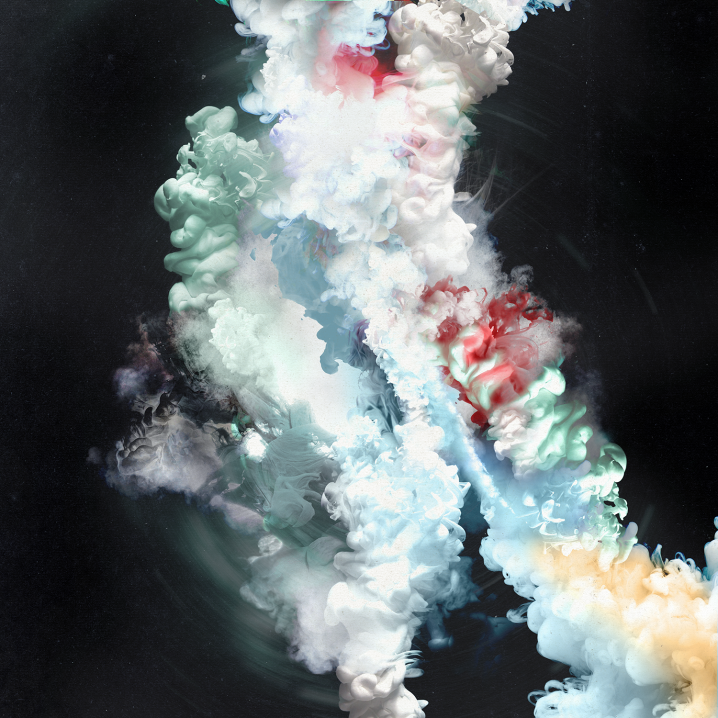
(click to zoom in for greater detail)
Can you talk a bit about your gorgeous artwork? How did you produce it and is there a concept that you were going for to compliment the music?
I try not to use explicit imagery when designing my sleeves, as I prefer to let the listener form their own narrative. A picture of a place or a person for example leaves less room for the imagination. I prefer working with more ambiguous themes and imagery, which can be interpreted in many different ways, to let each listener decide where it takes them. Saying that, I think the cover for “Dream Tempest” is quite easy to decode, especially when you consider the themes on the album anyway, along with the title. For me, it’s like when you’re dreaming and there’s a switch-over, where things change and become increasingly more unreal. It’s like a tempest in your brain, where reality breaks down, you become aware that you’re dreaming and eventually wake up. I interpret it as an analogy for growing up, understanding the world more, as I mentioned earlier.
I usually make quite a few different covers for my albums before eventually deciding on the one I like best, but I knew as soon as I finished this sleeve that it would be the one I used. It seems that a lot of people really like it, which makes me happy. Maybe one day I’ll press the album on vinyl, so more people can see it at the size I originally designed it at.
So are you an artist / graphic designer besides being a musician? How would you say the two mediums intertwine in your life?
Music and art have always been one in the same for me. It’s why I love physical mediums and will avoid releasing music purely digital, if at all possible. I was an artist and designer long before I became a music producer, so I’m quite fortunate that I get to be involved in all aspects of music creation, from the initial notes, right down to the artwork on the packaging. It also has the added bonus of saving me hundreds of pounds, not having to commission others to do the work for me!
Art and music are very similar in many ways. One deals with the harmony of colour, whereas the other deals with the harmony of sound. Both deal with composition, space and structure and both are made using various tools/instruments. I always say that if you are a designer or film-maker, then you’ll probably gravitate to music production quite well. Likewise, musicians often make very interesting and unique artwork, if they give it a chance. You can take the skills from one and use it in the other.
It’s why vinyl is so important for many artists. It’s a beautiful format and gives your music a physicality, which no other format can offer. When you buy a record and see the sleeve artwork in full-size, run your finger across the card and smell the ink, it’s just a different level of appreciation. You feel as though real love and attention went into it. An MP3 or FLAC is fine for casual listening, but just cannot compare on an artistic level.
I remember one of the professors at my university once asked me what I wanted to do when I graduated and I said that I’d love to make artwork for vinyl sleeves. He laughed at me and said I was about 30 years too late, but I had the final laugh! I don’t care if only 100 people bought my record and it was ignored by the masses. For those 100 people, they’ll treasure that vinyl for life, handle it with the same care as holding a baby, look after the sleeve, dust it, make sure it’s safe. It’s valuable to them beyond mere monetary value. That’s the power of design and music. It elevates music to the next level. It’s why I try not to get too sad when I see my music on shitty Russian blogs/forums, because these people will never understand what it’s truly like to completely fall in love with a piece of music. I’ll never feel this way about digital data. It’s just binary to me.

I hear that you’re one of the biggest video game nerds I’d ever meet. What platform is your favorite and why? Also, what would be the latest game that you’d recommend? And, speaking of video games, have you ever considered working on a soundtrack?
My dad bought me a Sinclair ZX Spectrum 48k in 1988 from a local car-boot sale and I have been pretty much obsessed with video games ever since. It’s funny because during the last 25 years, I’ve played more games than I can possibly remember, yet I still get excited when new games are released, despite my reservations with how certain aspects of the industry is changing. I’ve owned pretty much every console imaginable and I also build a new PC every few years to keep up to date with all the latest hardware, etc… it’s an expensive hobby!
It’s a great sense of escapism. Many people looked down on video games for the longest time, seeing them as this nerdy thing that only weird kids played in their bedrooms/basements, but these are the kind of people who have since grown up, had kids of their own, and now play the exact same games with their friends and families, having a load of fun in the process. It’s great that games are finally getting recognition from the previously stuffy art/award shows/charities, who now see the potential of games and their importance as potentially genuine works of art, which enthusiasts knew was always the case decades ago. It’s got to the point now where it’s more unusual for people NOT to play games. It’s a funny turnaround.
My favourite game of all time is the original Deus EX, I remember playing it back in 2001 on the PC and thinking “holy shit, this is the future of video games”. It was just a demo on the cover of PC Gamer or some other magazine and even though it ran horribly on my machine, the freedom that game offered, along with the amazing story, the characters, the sheer amount of things to do and ways to reach your objectives… that game changed everything for me. I mean I played through it multiple times, and discovered new things with every playthrough. Games up until this point always felt quite linear to me, something to get from A to B, but this was a game where I genuinely felt in control and could follow my own path. It’s an absolute masterpiece.
My latest obsession over the past 5 years is the Souls series by FROM Software. These are Demon’s Souls, Dark Souls and Dark Souls II. They’ve basically nailed the perfect video game for me; challenging, open, in-depth and totally engrossing. I absolutely lose myself in their worlds.
As for more recent games over the past year I’d recommend, I’ll start with Brothers: A Tale of Two Sons. It’s a wonderful, heart-wrenching game. Really beautifully made. It reminds me a bit of Journey in some ways, in that it feels like it’s lost in it’s own little world, totally unique. You can tell the developers poured a lot of love into it.
The Last of Us on the PS3 is great. It feels like you’re controlling genuine human characters, placed in this horrible situation out of their control, who you grow to truly care about. It’s really highly rated and for good reason. It has one of the best endings to any game I’ve played too. I’ll buy it again when it’s out on the PS4.
The latest game I’m playing and really enjoying is Divinity: Original Sin. I’ve been following it for a while and started playing it after I finished Dream Tempest. It’s a long, very involving game, which demands a lot of time/attention, so it wasn’t something I really wanted to play when working on an album! God knows, I have enough distractions as it is. It’s brilliant though. Very old school PC gaming and back to roots in many ways. Again, I love the freedom it offers and I think it’s brilliant that the developers made the game purely for the people who kickstarted it. It oozes passion.
As for working on soundtracks for games, alas I have never been offered! I love video game music though. My favourite soundtracks are Streets of Rage II, Journey, Chrono Trigger, Deus Ex, Zelda: Ocarina of Time, Silent Hill 2, Dragon Quest VIII, Sonic 2, Mass Effect, Limbo, Bioshock, Street Fighter II, Okami, Turrican… man I could go on forever. I love the older games for their catchy melodies, whereas newer games, I’m mostly interested in how the music adds to the gameplay/narrative, especially from an emotional standpoint. When you hear those cellos burn in Journey and see the desert sun in the horizon, it’s just something else. I’d love to do a game soundtrack, though a part of me also wants to stay away from games and keep them as a hobby, rather than work. It’s like when I started making music and began to understand how it worked. A part of the magic is lost, and often I listen to music now thinking production-related thoughts like “I know exactly what software he used to make that sound” rather than just getting lost in the music itself. I’d hate to feel that way when playing games.
Thank you for your time Dennis. Any last words for readers of Headphone Commute?
Just a big thank you to your readers and everyone else who has listened to my music. I’ve probably talked enough during this interview, so thanks for your patience and I hope you enjoy my new album!
Questions by HC
